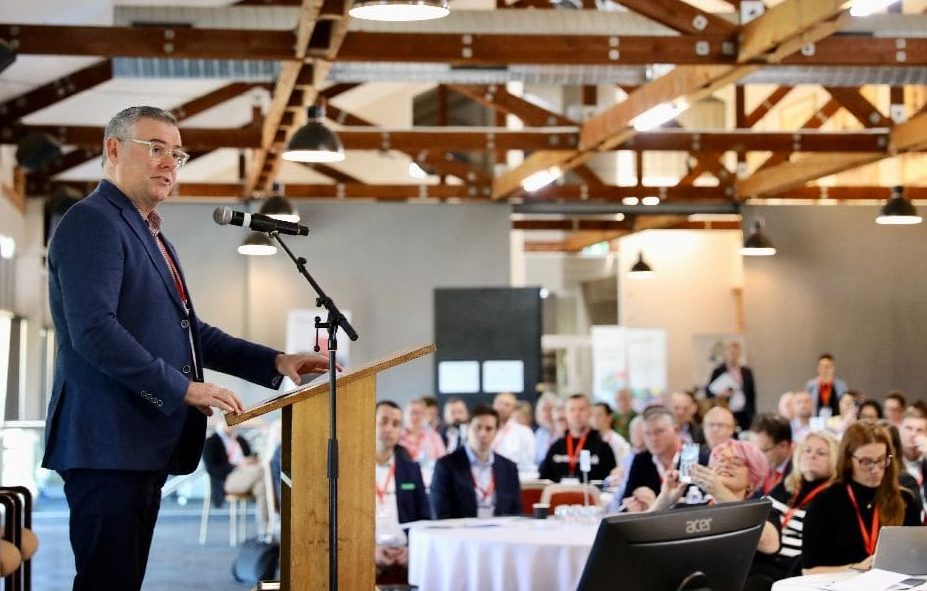
Murray Watt addressed 150 farmers, researchers and agriculture supply chain members in Toowoomba last week for the Sustainable Agriculture Summit. Photo: Murray Watt
THE FEDERAL Government is yet to formally back away from the controversial Biosecurity Protection Levy, despite its likely defeat in the Senate.
The government has also continued to stand behind the principle of the legislation which would charge agricultural producers $51.8 million to fund biosecurity initiatives.
At $12.25M, the grains industry was to contribute the largest proportion to this levy.
The legislation looked set for a Senate vote during the May 14-17 sitting week.
However, with the Greens and Independent Senator David Pocock publicly withdrawing support for the bills, the Agriculture (Biosecurity Protection) Levies Bill 2024 and related legislation never came before the Senate.
The levy was proposed to come into force from July 1.
Minister for Agriculture Murray Watt told media at the Sustainable Agriculture Summit on Thursday that the government was “considering our position” on the future of the legislation.
“Obviously that decision was only made by the crossbench last week,” Mr Watt said.
Mr Watt said the government did continue to support the principle of the legislation as “fair” for all biosecurity beneficiaries and risk creators.
“[J]ust as we’re asking taxpayers to pay a lot more for biosecurity than they’ve ever paid before, just as we’re making importers and risk-creators pay their fair share…we did think it was fair to ask farmers to make a very small contribution towards protecting their livelihoods from biosecurity incursions.
“Now, farmers already pay, I know, levies to deal with situations when we have biosecurity outbreaks and deal with the response.
“We thought it was a reasonable thing to ask farmers to pay a very small levy towards protecting their livelihoods.”
Mr Watt argued that under the legislation, farmers were to pay the smallest share compared to other contributors.
“[U]nder our proposal, we would have seen taxpayers pay roughly 43 percent of the cost of biosecurity operations, importers pay roughly 48pc of the cost with farmers being asked to pay about 6pc.
“[I] think (it is) a pretty small amount when you think about the $80-billion impact that it would have on our livestock industry if we had foot-and-mouth disease, for example.
“But…we’ve listened to what the crossbench have said, and we’ll consider our position from here.”
Other options considered
If the government opts not to put the legislation to a Senate vote, the Department of Agriculture, Fisheries and Forestry biosecurity budget would need to find an additional $52.8M to meet the shortfall.
In a statement, Mr Watt said “all options” were being considered to fund the biosecurity system.
“In saying ‘no’ to this reform, the Opposition and Greens political party are again expecting Australian taxpayers to reach into their pockets to pay more, instead of an industry contribution.
“The government remains committed to a sustainably funded biosecurity system, something the ag sector has called for for years.
“We will continue to consider all options to ensure we maximise available funding for biosecurity through a broad-based funding model that includes contributions from risk creators, taxpayers and system beneficiaries.”
However, Mr Watt has also made it clear that although a container levy or other increases to importer costs were on the table, both proposals were fraught with issues.
“Now, we’re having a good look at the container levy which would be paid by importers into the country.
“But one of the issues we’ve got to deal with is that the World Trade Organization has very clear rules around taxes and levies that can be placed on imports.
“And the last thing that I want to do as an agriculture minister in a country that exports 70pc of our production is do something which could cause us problems from the trading system.”
He said recent increases to importer fees and charges were recovering “the same amount of money that would be raised by a container levy”.
‘Taxpayers were subsidising importers for bringing their materials and provide biosecurity clearances.
“We fixed that, so now importers are paying the full cost of the services, which is how it should be.
“We’re raising the same amount of money that we would from a container levy.
“So, we’re actually achieving it in a different way without some of those risks around a World Trade Organization ruling.”
Alongside 14 other items, the levy bills remain on the Government business list for when the Senate next sits on June 24.
Grain Central: Get our free news straight to your inbox – Click here

HAVE YOUR SAY